Hinges and Stays: Difference between revisions
From DT Online
added main image |
Added Template |
||
| Line 1: | Line 1: | ||
[[File:Hinges.png|500px|right]] | [[File:Hinges.png|500px|right]] | ||
__TOC__ | |||
=====Description===== | |||
[https://en.wikipedia.org/wiki/Hinge '''Hinges'''] enable two parts of a product some limited rotation against each other ''(i.e.lid of a box, doors, and gates)''. They are available in a range of materials ''(e.g. steel, brass, plastics)'' and a variety of finishes ''(e.g. polished, [https://en.wikipedia.org/wiki/Electroplating electro-plated], [https://en.wikipedia.org/wiki/Galvanization galvanised] and [https://en.wikipedia.org/wiki/Japanning Japanned])''. | [https://en.wikipedia.org/wiki/Hinge '''Hinges'''] enable two parts of a product some limited rotation against each other ''(i.e.lid of a box, doors, and gates)''. They are available in a range of materials ''(e.g. steel, brass, plastics)'' and a variety of finishes ''(e.g. polished, [https://en.wikipedia.org/wiki/Electroplating electro-plated], [https://en.wikipedia.org/wiki/Galvanization galvanised] and [https://en.wikipedia.org/wiki/Japanning Japanned])''. | ||
| Line 9: | Line 13: | ||
=====Features and Applications===== | |||
{| | {| | ||
|- | |- | ||
| Line 79: | Line 84: | ||
| [[File:SurfaceLimitingDoorWindowStays.png|150px|right]] | | [[File:SurfaceLimitingDoorWindowStays.png|150px|right]] | ||
|} | |} | ||
{{Hinges Buyers Guide}} | |||
[[Category:Fixings and Fastenings]] | [[Category:Fixings and Fastenings]] | ||
Latest revision as of 17:45, 16 June 2016
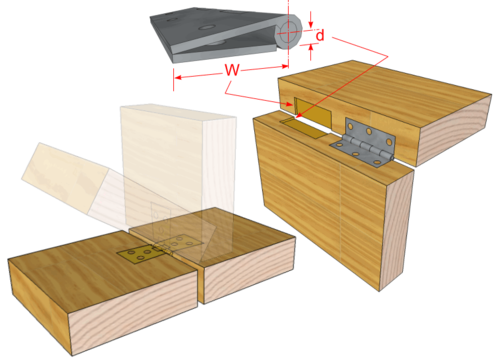
Description
Hinges enable two parts of a product some limited rotation against each other (i.e.lid of a box, doors, and gates). They are available in a range of materials (e.g. steel, brass, plastics) and a variety of finishes (e.g. polished, electro-plated, galvanised and Japanned).
Many hinges are set into the body of the product in some way (e.g. recesses, mortises or holes cut or drilled into the abutting edges) and others are applied directly to the surface.
Stays in general are any device which steadies or supports a structure in some way (e.g. Guy Ropes or Wires used to support boat masts, aerial masts and tents) and, in the the context of this article, Cabinet Stays are used to restrict, limit or control hinge rotation.
Features and Applications
| Butt Hinge | Available as both Broad Butts and Narrow Butts dependent on the width of flange or leaf, these are recessed into the abutting edges of doors lids such that only the knuckle of the hinge is visible. | 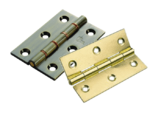 |
| Back Flap HInge | These are similar to Butt Hinges but have a wider flange. They are used for table flaps and traditionally for construction projects such as step ladders. | 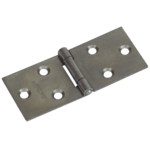 |
| Flush HInge | Also variously known as Easi-Fit or Fast-Fix these are for similar applications to Butt HInges but are surface mounted requiring no recess to be cut. | 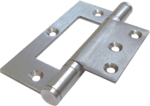 |
| Butterfly HInge | A surface mounted hinge with decorative shaped flanges usually plated or made in a suitably decorative material such as brass. | 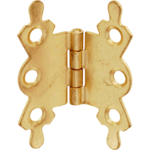 |
| Parliament HInge | Designed with a wide flange which is drilled such that when mounted, the knuckle stands proud of the door frame allowing a door to fold completely back on itself and avoid obstacles such as skirting boards | 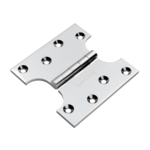 |
| Piano HInge | Also known as Strip Hinges these are a continuous narrow Butt type hinge in lengths up to and in excess of a metre which are used for used for hingeing box lids, cabinet doors and fall-fronts for example. | 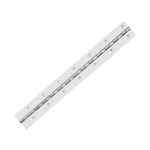 |
| Rise and Fall HInge | A heavy duty Butt HInge designed such that the door rises as it is opened in order to clear floor coverings such as carpets. The rise and fall action can be regarded as an example of a Cylindrical Cam | 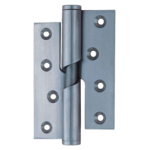 |
| Flag Hinge | With a pin fixed to one of the two flanges these hinges can be lifted off. They are manufactured as left or right hand and modern versions are most commonly seen on Patio Doors for example. | 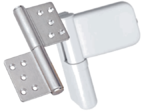 |
| Card Table HInges | Also known as Counter Flap Hinges, these are designed to allow two flaps to fold over and lie flat against each other as with a traditional card table. | 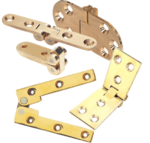 |
| Soss and Barrel HInges | Card Table type hinges which are set into the edges of a fold-over flap either by a mortise or a drilled hole. | 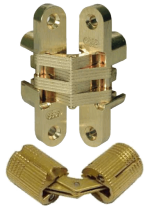 |
| Strap Hinge | Hinges with a long but narrow flange which can be set into a box frame edge for example to hinge the lid. | 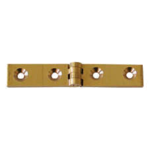 |
| Tee Hinge | Screwed to the face of a the job and used mainly for external construction work such as ledged and braced doors and gates. Illustrated with a version of a Strap Hinge also used for this class of work. | 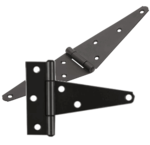 |
| Euro HInge | Also known as a Concealed HInge these are most commonly used on kitchen cabinet doors. They allow a wide range of door adjustrment in situ. | 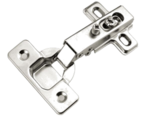 |
| Quadrant Hinge | A hinge with a built-in stay | 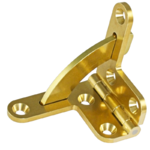 |
| Lid Stay | Used with top-hung lids or flaps to hold them in an open position until released. | 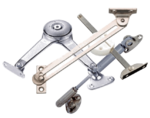 |
| Flap Stay | These limit the drop of a fall-front flap or drop-leaf for example | 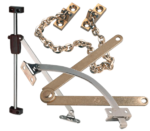 |
| Door or Window Stay | Used to control or restrict opening and/or closing, friction stays are commonly fitted to modern uPVC doors and windows. |  |











